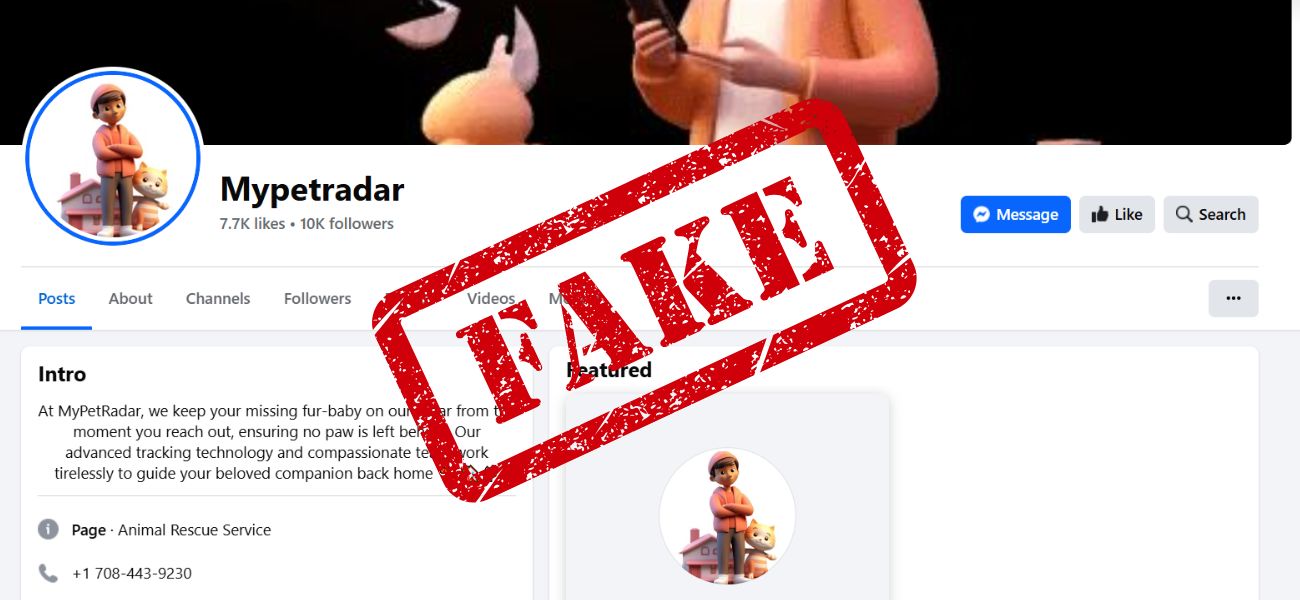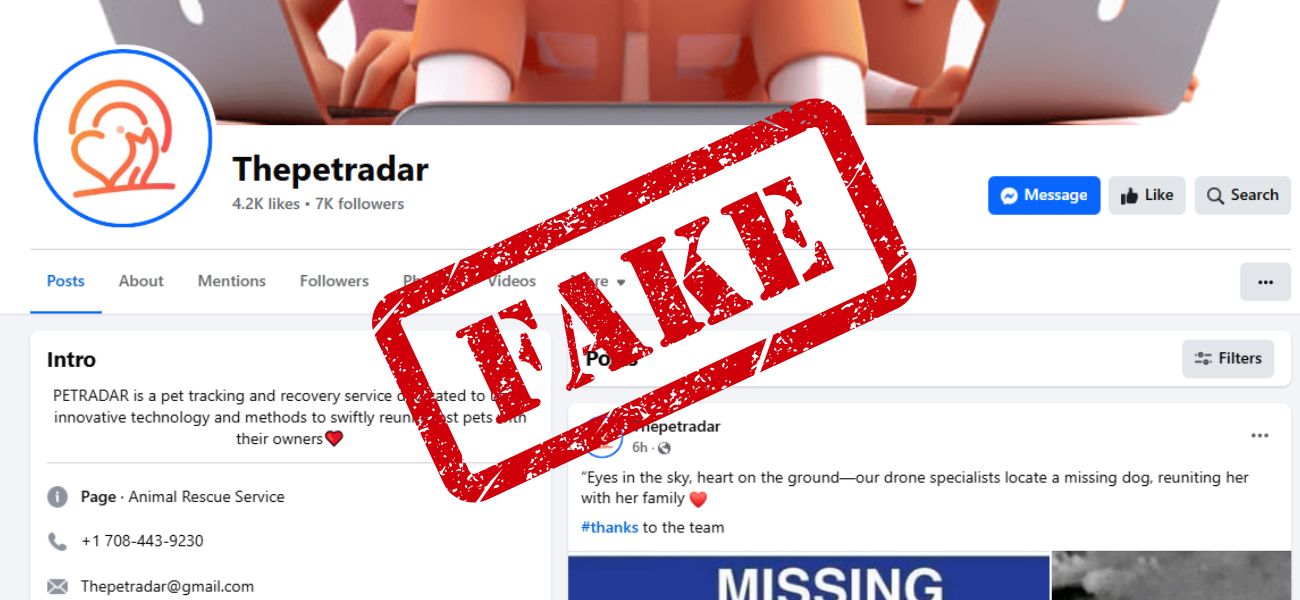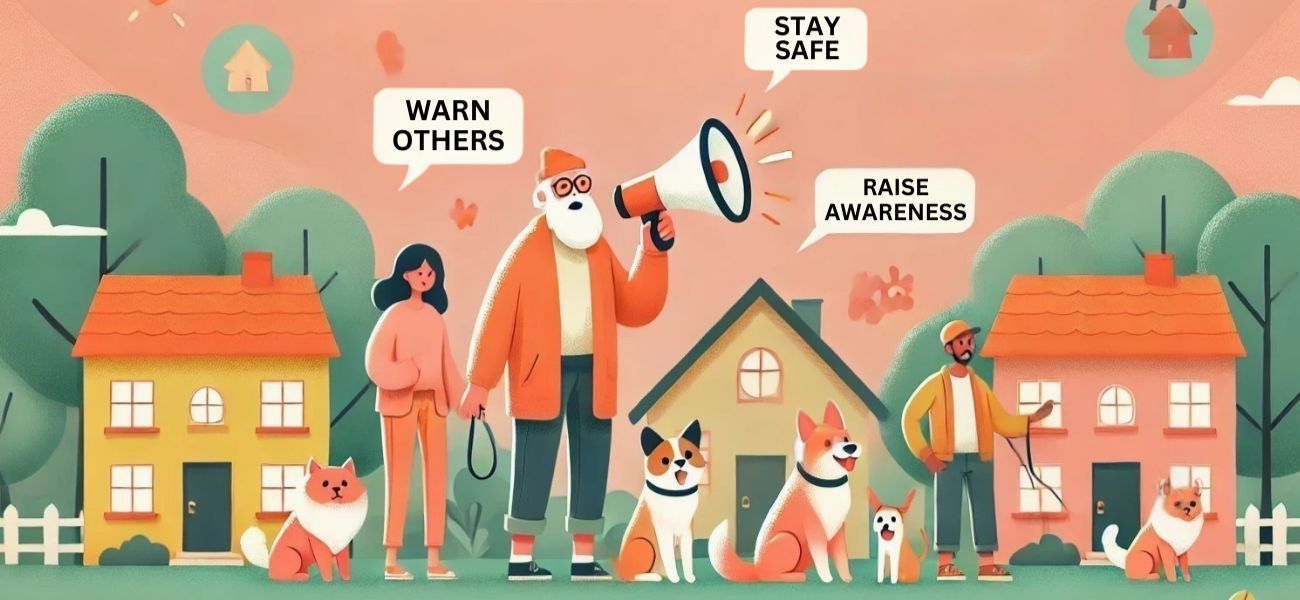Key takeaways
Spotting Scams: Learn to identify common scams and protect yourself from deception.
Steps to Take If You've Been Scammed: Get actionable advice on how to respond after falling victim to a scam.
How PetRadar Protects You: Discover the tools and systems we've implemented to safeguard your search and keep your personal information secure.
Quick Navigation
At PetRadar, we've experienced this firsthand - not only through the heartbreaking stories shared by pet parents, but also as a target ourselves. Scammers have impersonated our platform, even copying our logo, to deceive pet owners. 🙀
But we remain dedicated to protecting and supporting you during your search. That's why we've put together this guide to help you identify the most common scams, stay safe, and focus on reuniting with your furry family member.
Common Lost Pet Scams
1. Impersonating Trusted Organizations (Like PetRadar)
Claim they can find your pet for a fee (e.g., $100 paid via unsafe methods like Venmo or direct bank transfer).
Use photoshopped images and fake videos to fabricate evidence.
Send emails or messages from unofficial accounts, like Gmail and Facebook Messenger, pretending to represent us.
Their email address is a simple Gmail account - a clear red flag. All communication from PetRadar will always come from official @petradar.org email addresses. If you come across these pages, please report it immediately to help protect our community!


Always verify email addresses – PetRadar's official communications come from emails ending in @petradar.org and never through Facebook messenger, Gmail, Yahoo accounts.
Avoid payments via apps like Venmo or CashApp. PetRadar only processes payments securely through our official website.
Remember, the only way to register a pet with PetRadar is directly through our official website. We do not process registrations through Facebook, text, phone calls, or any other method.
2. Ransom Demands
Refuse to provide proof of having your pet.
Send altered photos that look similar to your missing pet.
Avoid sharing their location or personal information.
Always ask for a recent photo or video of your pet.
Avoid transferring money until you have undeniable proof.
Report ransom demands to local authorities immediately.
3. Fake Drone or Thermal Imaging Searches
Use overly technical jargon to confuse and impress.
Demand upfront payment, a lot of the times with inflated prices.
Research any company or individual offering such services.
Verify that they have a secure and professional website with proper contact details.
Check if the service is local, as drone or thermal imaging searches are often only offered in specific areas.
4. Suspicious Social Media Comments
Check the commenter's profile. Red flags include no profile photo, limited activity, or posts that don't align with a real person's account.
Don't click on suspicious links or send messages without confirming the legitimacy of the page or service.
Verify the recommended service. Legitimate services will have a transparent online presence with verifiable contact details.
5. Pretending to Be Animal Control or a Veterinarian
Request a recent video of your pet to confirm their identity.
Politely ask for the clinic's name and address, and offer to make the payment in person. A legitimate clinic will always allow this.
If they're pressuring you or refusing to provide proof, take a step back. Real clinics won't demand upfront payment without letting you verify their claims.
What to Do If You've Been Scammed
1. Report the Fraud to Your Bank or Payment App
2. Report the Fraudulent Page or Profile
Go to the page or profile.
Tap the three dots (…) under the cover photo.
Select "Report page."
Choose "Scam, Fraud, or False Information" and follow the instructions
Click "Submit"
3. Contact Local Authorities
4. Warn Others

How PetRadar Protects You
📲 QR Code Posters: People can report sightings easily without needing your personal contact details.
💳 Secure Payment Methods: All transactions are processed through our platform, providing encryption and buyer protection.
🔒 Verified and Secure Website: Our website is SSL-certified, ensuring your data and interactions are always protected.
🔍 Sighting Form on Our Website: Ensures all sightings are directly sent to you securely.
🛡️ Staying Ahead of Scams: We're constantly monitoring for new fraud tactics, writing guides like this, and sharing updates to keep our community informed and protected.



